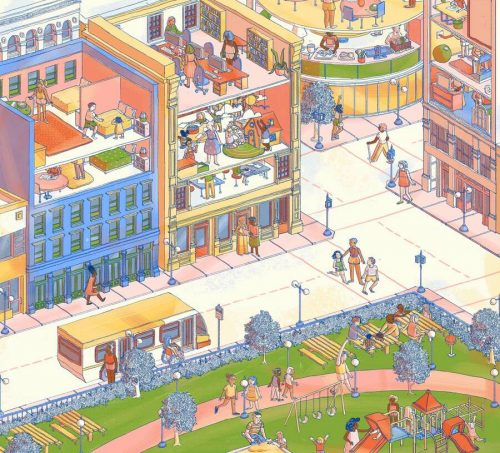With the second reading list post of 2021, I’ve moved mostly to fiction (with a bit of feminist geography thrown in!). No TV shows or movies this time. Just books.
Leslie Kern – Feminist City
Kern’s premise here is that societies build modern cities for men. They build public spaces for men and crowd out both women and people with disabilities. In terms of its basic perspective, Kern’s book reads like a contemporary version of Jane Jacobs.
The book has a lot of promise, and Kern does a nice job cataloging some of the ways the city is hostile to women and other people who aren’t cisgender men. But the book never really lives up to its promise of creating a vision for a new city (the ‘feminist city’ of the book’s title). In that sense, the book reads more like a really long – and informative – article in Bitch magazine than it does like an analysis and vision for a better city.
Suzanne Park – Loathe at First Sight
Park’s novel tells the story of a young Korean women working in the tech industry. It covers both the cultural novelties of growing up Korean in the U.S. and the aggression women – and women of color in particular – face in the tech industry.
In the end, the story is a rom-com, which is where it loses much of its interest to me. It never really breaks out of the cookie-cutter form of the rom-com, which I’ve never found compelling. Had the story moved past that model, I think it could’ve been a great story.
Kurt Vonnegut – Player Piano
Player Piano is one of Vonnegut’s earlier novels, and he tries his hand at writing a dystopia. The basic premise here is a society where automation forces people into immiseration and drives class conflict between an elite professional-managerial class and a mass peasantry sustained through something like universal basic income.
Vonnegut develops this scenario plausibly. Both the PMC and the peasant class suffer from various kinds of ennui and dissatisfaction. And it all transfers remarkably well to the present day. It’s worth reminder readers, thought, that these kinds of automation dystopia visions were very common in the 1950s. Awhile back, I wrote about The Caves of Steel – another version of a future automated society published in the 1950s.
The 100 (4-book series: The 100, Day 21, Homecoming, Rebellion)
I recently finished up The 100 television show and thought I’d revisit the book series after I finished. For anyone not in the know, these are very different stories. Both the TV show and the Kass Morgan novels begin from the same basic premise: in a post-apocalyptic society, the remains of humanity live on a space station above the ruined earth and send 100 teenage prisoners to the planet to see if it’s habitable. But after that, the stories veer off in totally different directions.
Unlike the show, the books stay on Earth. Mostly Morgan’s novels focus on the everyday teen drama the TV show began avoiding about halfway through its first season.
In truth, while the novels remain interesting and compelling, the overall story is a hot mess. The TV show did a lot more with this material than I’d have expected merely from reading the books.
Reading List Series
As I’m sure many readers know, I do one of these lists each month. You can find them under the tag “Books.” But here’s a link to the last couple of lists:
